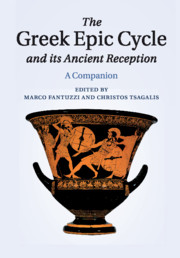Book contents
- Frontmatter
- Contents
- List of illustrations
- List of contributors
- Editorial note
- Introduction: Kyklos, the Epic Cycle and Cyclic poetry
- PART I APPROACHES TO THE EPIC CYCLE
- 1 Coming adrift: The limits of reconstruction of the cyclic poems
- 2 Oral traditions, written texts, and questions of authorship
- 3 The Epic Cycle and oral tradition
- 4 The formation of the Epic Cycle
- 5 Motif and source research: Neoanalysis, Homer, and Cyclic epic
- 6 Meta-Cyclic epic and Homeric poetry
- 7 Language and meter of the Epic Cycle
- 8 Narrative techniques in the Epic Cycle
- 9 Wit and irony in the Epic Cycle
- 10 The Trojan War in early Greek art
- PART II EPICS
- PART III THE FORTUNE OF THE EPIC CYCLE IN THE ANCIENT WORLD
- Works cited
- Index of principal passages
- Index nominum et rerum
5 - Motif and source research: Neoanalysis, Homer, and Cyclic epic
from PART I - APPROACHES TO THE EPIC CYCLE
Published online by Cambridge University Press: 05 August 2015
- Frontmatter
- Contents
- List of illustrations
- List of contributors
- Editorial note
- Introduction: Kyklos, the Epic Cycle and Cyclic poetry
- PART I APPROACHES TO THE EPIC CYCLE
- 1 Coming adrift: The limits of reconstruction of the cyclic poems
- 2 Oral traditions, written texts, and questions of authorship
- 3 The Epic Cycle and oral tradition
- 4 The formation of the Epic Cycle
- 5 Motif and source research: Neoanalysis, Homer, and Cyclic epic
- 6 Meta-Cyclic epic and Homeric poetry
- 7 Language and meter of the Epic Cycle
- 8 Narrative techniques in the Epic Cycle
- 9 Wit and irony in the Epic Cycle
- 10 The Trojan War in early Greek art
- PART II EPICS
- PART III THE FORTUNE OF THE EPIC CYCLE IN THE ANCIENT WORLD
- Works cited
- Index of principal passages
- Index nominum et rerum
Summary
Introduction
The Homeric Iliad narrates only a specific episode of the Trojan War but, as becomes clear from numerous allusions, nonetheless takes for granted its audience's familiarity with the legend of the whole war. It is impossible to understand the Iliad without knowledge of its mythical background. At the time of composition of the Iliad, this was probably known only in the form of orally performed lays or minor epics, being recorded in comprehensive written form only towards the end of the seventh century in the Cyclic epics. The date of the first written version of the Iliad is contested. My own assumption is that, after a long period of work carried out in stages, it was completed in writing by the author in the first half of the seventh century; Martin West, among others, is of a similar opinion. It is obvious that there are close connections between the allusions to Trojan legends in the Iliad and the subject matter of the Cyclic epics: it is to these that the research of neoanalysis is directed. The most important source for the content of these lost epics can be found in the summaries of Proclus' Chrestomathy: for the Cypria these are preserved in various Homeric manuscripts, but for the other Cyclic epics only in the manuscript Venetus A. Complementary information can be found in the fragments, in the Odyssey and in Ps.-Apollodorus' Bibliotheca, a handbook of mythography. But in the latter case it is not certain that the information invariably goes back to the Cyclic epics. In our opinion, the main literary difference between the Iliad on the one hand and, on the other, the Cyclic epics or the pre-Homeric oral epic tradition preserved in these epics lies in the dramatic and psychologically deeper composition of the Iliad, with its numerous and continuous threads of motif, independent of the limited length of an oral presentation, and in the chronological style of narrative of the epic tradition as found in the Cycle. Oralists like Burgess also emphasize the differences of style and call that of the Iliad ‘meta-Cyclic’.
Proclus' summaries are cited according to my own numeration by paragraphs.3 For the Cypria and the Aethiopis, which in terms of mythical chronology directly frame the Iliad, we will give a translation to ease comparison.
- Type
- Chapter
- Information
- The Greek Epic Cycle and its Ancient ReceptionA Companion, pp. 108 - 125Publisher: Cambridge University PressPrint publication year: 2015
- 4
- Cited by

